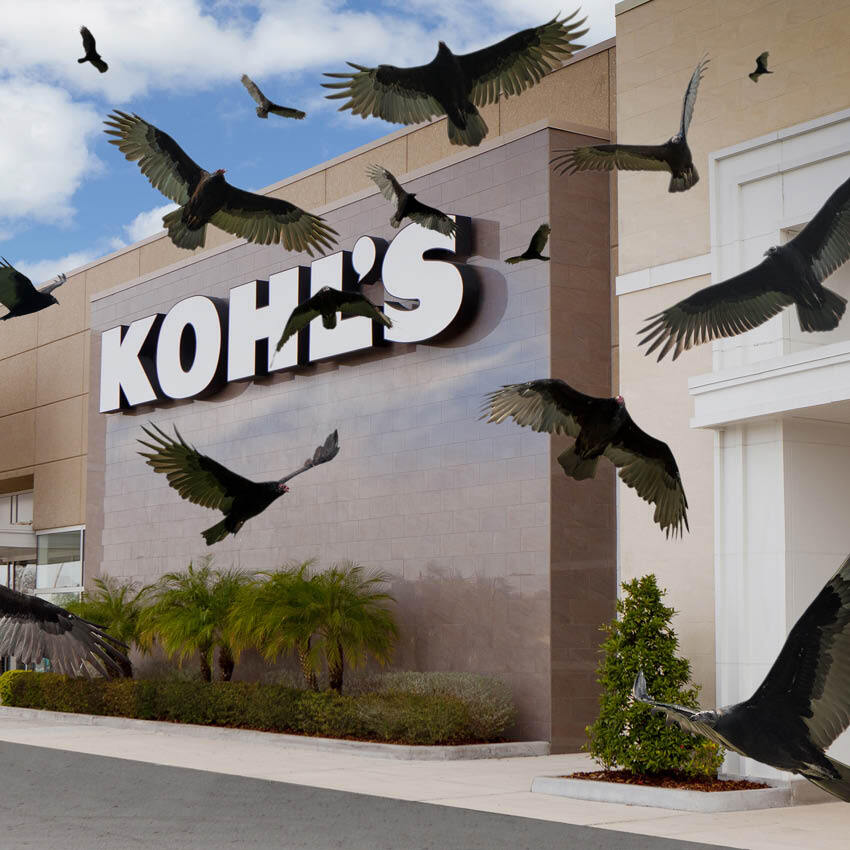A year ago, Kohl’s beat back a campaign by four activist investment funds to unseat its board and shake up its operations. The activists settled for smaller changes at the board level: adding three new directors, creating a standing finance committee to oversee capital allocation, and authorizing a $2 billion share repurchase program.
The department store didn’t get a very long reprieve, though. In early December, Engine Capital called for Kohl’s to either spin off its ecommerce business as a separate entity or sell the whole company. And in January, Macellum Advisors (the leader of last year’s activist campaign) resumed its attack on the company.
Kohl’s isn’t a lost cause, differentiating it from weaker department store chains such as Lord & Taylor and J.C. Penney that went bankrupt during the pandemic. Also, Kohl’s doesn’t have the founding family as a large shareholder to push back against activists’ demands, unlike Nordstrom or Dillard’s.
In another twist, Kohl’s received at least one and possibly two private equity buyout offers last month. This has added to the pressure on the board and management, putting Kohl’s in a tricky situation as it tries to mollify shareholders while focusing on executing its long-term strategy.
Rise of the Activists
Shareholder activism has been on the rise in the U.S. for years. Dedicated activist funds try to earn high returns by investing in underperforming companies and agitating for change.
In many ways, Kohl’s is an obvious target for activists. Between 1999 and 2011, the company quadrupled net sales from $4.6 billion to $18.8 billion. However, sales have stagnated around $19 billion since then (aside from 2020, when the pandemic crushed sales). Kohl’s inability to grow the top line has caused its operating margin to contract, reducing its earnings. As a result, between the beginning of 2001 and the end of 2021, Kohl’s stock declined slightly, whereas the broader market more than tripled.
At the same time, Kohl’s isn’t a lost cause, differentiating it from weaker department store chains such as Lord & Taylor and J.C. Penney that went bankrupt during the pandemic. Just as importantly, Kohl’s doesn’t have the founding family as a large shareholder to push back against activists’ demands, unlike Nordstrom or Dillard’s.
Activist investors see multiple pathways to making big gains in Kohl’s stock. These include reinvigorating top-line growth, driving margin expansion, and using financial engineering tactics to unlock a higher valuation. Yet many of their suggestions are half-baked ideas, and they don’t have a firm grasp of what it takes for a retailer to succeed in the long run.
A Naive View of Retail
Engine Capital’s proposed strategy for Kohl’s is an extreme case. In early December, the fund sent a letter to the Kohl’s board, highlighting the stock’s weak historical performance and calling for a “review of strategic alternatives.”
In the letter, Engine Capital asserts that Kohl’s should spin off its ecommerce business because it “could be conservatively valued at $12.4 billion or more.” That valuation of roughly two times sales corresponds to what Insight Partners paid for a minority stake in Saks Fifth Avenue’s ecommerce business last March.
Yet Kohl’s has a much different margin structure than Saks. With lower AURs, shipping costs are a bigger burden for online orders, making tight integration between the stores and ecommerce absolutely essential. Separating the two channels would hurt both in the long run. It’s also quite possible that Insight Partners overpaid for Saks.com. Other pure-play ecommerce firms’ valuations have plunged over the past year as physical retail has reopened. (For example, shares of both Wayfair and Chewy have lost about half of their value since last February.)
Thus, Engine Capital’s main proposal probably wouldn’t reap the short-term windfall that the activist fund expects. Meanwhile, it would risk crippling Kohl’s in the long run.
Macellum Advisors has a little more retail knowledge. Founder Jonathan Duskin has led activist campaigns at half a dozen other retailers over the past decade, with mixed results. The fund has some vague suggestions for operational improvement, e.g. improve the merchandise assortment, simplify the value proposition, and bring private-label sourcing in-house.
However, most of its proposals relate to financial engineering. Macellum urges Kohl’s to ramp up share repurchases beyond the company’s recent target of $1.3 billion annually. It claims these buybacks can be funded partly by reducing what it sees as wasteful expenditures on growth initiatives and partly by entering sale-leaseback arrangements for billions of dollars of real estate. Duskin and company seem to ignore the fact that cutting investments in growth wouldn’t just lead to flat sales: it could cause revenue to erode rapidly. (Just ask Sears or J.C. Penney!)
Macellum’s letter to the board also touts the ecommerce spinoff idea. Lastly, the fund urges the board to try to sell the company outright: something that Engine Capital also proposed.
Potential Buyers Come out of the Woodwork
Perhaps emboldened by the presence of activist investors pushing for Kohl’s to sell itself, private equity firms are now circling the retailer. Last month, Acacia Research (itself backed by another activist fund, Starboard Value) offered $64 per share in cash for the company. Prior to the offer, Kohl’s stock had been trading a little below $50.
Sycamore Partners quickly jumped into the fray and has reportedly offered $65 per share. Kohl’s has acknowledged receiving offers for the company without confirming the potential buyers.
These proposals value Kohl’s at around $9 billion. Either buyer would likely finance the bulk of the purchase price by selling Kohl’s real estate and leasing it back. That would saddle the company with higher rent obligations going forward, but it would be more affordable than turning to the debt markets. When the Nordstrom family attempted to take Nordstrom private in 2017, banks demanded interest rates around 13 percent.
Kohl’s most recent guidance calls for adjusted earnings per share between $7.10 and $7.30 in fiscal 2021. Compared to that earnings power, the Acacia Research and Sycamore Partners offers look like lowball opening bids.
Looking for Quick Gains
One common thread ties together the activist campaigns and buyout offers for Kohl’s: investment funds see an opportunity to make a lot of money quickly. That’s why in recent weeks, Engine Capital and Macellum Advisors have urged Kohl’s to sell itself, even though both funds initially argued that the stock was worth far more than what Acacia and Sycamore have offered.
Meanwhile, if a private equity firm can snag Kohl’s for $65 or even $75 per share, it would likely make a killing within a few years. By putting in $2 billion-$3 billion up front and financing the rest with sale-leasebacks and a modest amount of new debt, the buyer would get a business capable of generating about $1 billion of free cash flow annually.
Ironically, shareholders would likely make even bigger gains by being patient. Kohl’s expects to report a record profit for fiscal 2021. Macellum Advisors and Engine Capital think that isn’t good enough, pointing to other retailers that have posted even stronger revenue and profit growth compared to 2019. They also claim that since Kohl’s has failed to grow its sales over the past decade, the company’s current strategies are likely to be equally unsuccessful.
Yet Michelle Gass became Kohl’s CEO less than four years ago. The pandemic has disrupted more than half of her tenure. Additionally, the global supply chain crisis has led to delayed receipts for new merchandise, particularly in women’s apparel, hindering efforts to reignite sales growth there. Finally, Kohl’s just began to open Sephora shops in its stores last August. The Sephora partnership is a promising initiative to drive traffic and expand Kohl’s customer base, but it will take two years to complete the in-store rollout.
Of course, there’s no guarantee that these initiatives will get Kohl’s back to sustainable growth. But it would be foolish to throw in the towel (as the activists urge) just because of the company’s mediocre results in recent years. It’s simply too early to know whether Gass’ turnaround strategy will ultimately succeed. Once Kohl’s completes the Sephora rollout and gets inventory levels back to normal, it will be possibly to evaluate management’s success more fairly.
Target investors also had to endure meager sales growth and weak share price performance for most of the past decade. They have been richly rewarded over the past three years, though, as CEO Brian Cornell’s growth strategy has finally gained traction. This demonstrates the value of patience, as sound retail strategies don’t always pay off quickly.
Fortunately, Kohl’s has a decent shot at fending off both its suitors and its activist shareholders. Given that Kohl’s stock traded above $80 as recently as 2018, the board is unlikely to agree to a sale at a price that private equity firms would be willing to pay. And if the company keeps reporting record earnings, activist funds will struggle to convince other shareholders to support a board or management shakeup. That’s probably good news for customers, employees, long-term investors, and the retail industry as a whole.
Full disclosure: The author owns shares of Kohl’s and Nordstrom.




